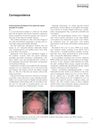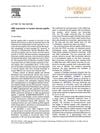 January 2024 in “International journal of pharmaceutical sciences review and research”
January 2024 in “International journal of pharmaceutical sciences review and research” Indian jujube has many medicinal properties and can help treat ailments like diabetes, inflammation, and cancer.
 3 citations,
July 2020 in “Frontiers in Cell and Developmental Biology”
3 citations,
July 2020 in “Frontiers in Cell and Developmental Biology” Vitexin Compound 1 may help reduce skin aging caused by UVA light.
 4 citations,
March 2023 in “Journal of Cosmetic Dermatology”
4 citations,
March 2023 in “Journal of Cosmetic Dermatology” Carboxytherapy is a safe and effective treatment for improving skin appearance and treating various skin conditions, with mild side effects.
[object Object] 12 citations,
October 2018 in “Biotechnology reports” Recombinant keratin K31 makes damaged hair thicker, stronger, and straighter.
12 citations,
October 1952 in “Experimental biology and medicine” Vitamin B12 and aureomycin reduce the negative effects of high doses of cortisone in rats.
 November 2023 in “International Journal of Advanced Research in Science, Communication and Technology”
November 2023 in “International Journal of Advanced Research in Science, Communication and Technology” The herbal hair oil was more effective at reducing hair fall than coconut oil.
34 citations,
April 2012 in “Molecular Biology Reports” The enzyme from Bacillus cereus can be used in detergents and leather processing.
 61 citations,
June 2010 in “European Journal of Pharmaceutics and Biopharmaceutics”
61 citations,
June 2010 in “European Journal of Pharmaceutics and Biopharmaceutics” Cationic polymers improved liposome stability and increased skin absorption of aciclovir and minoxidil.
 May 2023 in “Stem cell research & therapy”
May 2023 in “Stem cell research & therapy” New method efficiently isolates hair growth cells from newborn mouse skin.
47 citations,
September 2011 in “Acta biomaterialia” Protein composition greatly affects the function of keratin biomaterials.
[object Object]  158 citations,
May 1968 in “The journal of nutrition/The Journal of nutrition”
158 citations,
May 1968 in “The journal of nutrition/The Journal of nutrition” Zinc is crucial for growth and health in rats.
 12 citations,
November 2011 in “International Journal of Dermatology”
12 citations,
November 2011 in “International Journal of Dermatology” A woman developed a scalp condition from using minoxidil, which improved with a different treatment but left scarring.
 22 citations,
April 1998 in “Dermatologic Clinics”
22 citations,
April 1998 in “Dermatologic Clinics” Interferons are effective for some skin conditions and cancers, but can have side effects and need more research for optimal use.
13 citations,
January 2002 in “Biological chemistry” Different conditions affect how hair proteins assemble, and certain mutations can change their structure.
 November 2009 in “Regenerative Medicine”
November 2009 in “Regenerative Medicine” The regenerative medicine industry saw business growth with new partnerships, clinical trials, and financial investments.
 October 2022 in “Benha Journal of Applied Sciences”
October 2022 in “Benha Journal of Applied Sciences” Human Beta Defensin 1 levels do not predict the risk or severity of Alopecia Areata.
 20 citations,
October 2008 in “Archives of dermatological research”
20 citations,
October 2008 in “Archives of dermatological research” Angiogenin helps hair grow by stimulating cell growth and blood vessel formation.
 41 citations,
November 2020 in “Colloids and surfaces. B, Biointerfaces”
41 citations,
November 2020 in “Colloids and surfaces. B, Biointerfaces” Different hair protein amounts change the strength of keratin/chitosan gels, useful for making predictable tissue engineering materials.

Ostrich antibodies can help restore hair growth in people with a specific type of hair loss, increasing hair count by 71% on average.
 1 citations,
January 2018 in “Journal of Cosmetics, Dermatological Sciences and Applications”
1 citations,
January 2018 in “Journal of Cosmetics, Dermatological Sciences and Applications” Ostrich antibodies helped regrow hair in men with hair loss, but the application needs to be easier.
 2 citations,
January 2022 in “Genetics Research”
2 citations,
January 2022 in “Genetics Research” Using hemocoagulase with platelet-rich plasma in hip replacement can lessen blood loss and improve healing and blood clotting.
 22 citations,
August 2011 in “Journal of Supercritical Fluids”
22 citations,
August 2011 in “Journal of Supercritical Fluids” Rice bran extract might help prevent hair loss.
 29 citations,
January 2006 in “Clinical chemistry and laboratory medicine”
29 citations,
January 2006 in “Clinical chemistry and laboratory medicine” SHBG binding properties are unchanged in male liver cirrhosis patients.
 3 citations,
June 2017 in “Medical lasers”
3 citations,
June 2017 in “Medical lasers” A treatment combining laser energy and injections improved hair loss and unexpectedly also reduced hair graying.
 January 2023 in “Applied sciences”
January 2023 in “Applied sciences” Gefitinib and Sasam-Kyeongokgo together significantly reduce cancer growth and improve immune response in mice.
42 citations,
June 1998 in “The journal of investigative dermatology/Journal of investigative dermatology” PAI-2 helps in the maturation and protection of hair and nail cells.
 22 citations,
January 2008 in “Physiological Research”
22 citations,
January 2008 in “Physiological Research” Steroid sulfatase is important for activating hormones that affect memory, brain function, and certain diseases, and could be a target for treating hormone-related disorders.
 June 2024 in “Korean Journal of Pharmacognosy”
June 2024 in “Korean Journal of Pharmacognosy” The compound from Rhododendron mucronulatum roots may help treat male pattern hair loss.
 39 citations,
April 2011 in “Recent Patents on Drug Delivery & Formulation”
39 citations,
April 2011 in “Recent Patents on Drug Delivery & Formulation” Nanoemulsion-based drug delivery systems are versatile and have potential for treating various medical conditions and improving vaccines.
 7 citations,
July 2005 in “Journal of Dermatological Science”
7 citations,
July 2005 in “Journal of Dermatological Science” The gene URB is more active in human hair growth cells and responds to a hair-related hormone.
























